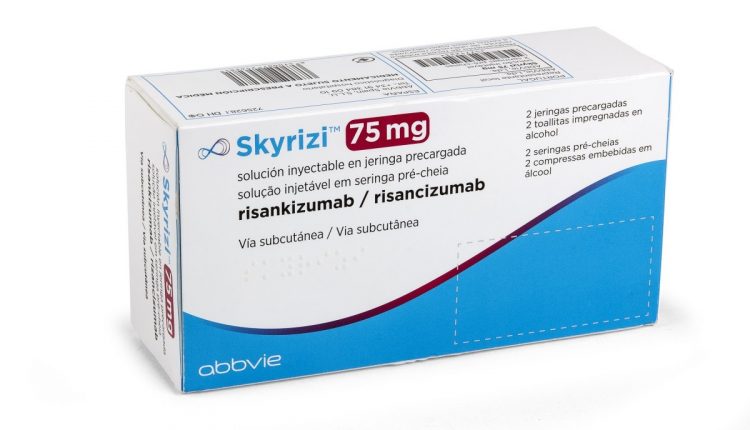
USA: FDA Approves Skyrizi to Treat Crohn’s Disease
The Food and Drug Administration (FDA) last week approved Skyrizi (risankizumab-rzaa) to treat Crohn’s disease, a type of inflammatory bowel disease (IBD)
The drug, made by AbbVie, was already approved for treating psoriasis.1
Now, health providers may prescribe it for adults with moderately to severely active Crohn’s disease.2
Skyrizi uses a unique mechanism that may alleviate symptoms such as diarrhea and abdominal pain, even in patients who don’t respond well to other treatments
It is given intravenously by a health provider for the first three doses. After that, the patient self-injects the medicine every other month.
Skyrizi is the first interleukin-23 inhibitor licensed for Crohn’s—an approach that has long seemed promising for tamping autoimmune disorders.
It is the first treatment licensed for Crohn’s disease in six years, according to AbbVie.
“We’re very excited to have another modality in our arsenal to tackle [Crohn’s] and to tackle it more selectively,” Randy Longman, MD, PhD, an ulcerative colitis and Crohn’s disease expert and director of the Jill Roberts Center for Inflammatory Bowel Disease at Weill Cornell Medicine, told.
“It’s really a huge win for patients with IBD and gives another medication option, particularly for patients who are refractory.”
Skyrizi, The Road to Approval
Crohn’s disease is a chronic inflammatory bowel syndrome that causes persistent diarrhea and abdominal pain.
It is a progressive disease, which means that a case may get worse over time, often leading to surgery.
Current treatments are designed to tamp down the immune system’s inflammatory response in the gastrointestinal tract to help alleviate symptoms.
Skyrizi is a biologic drug that inhibits certain proteins that help regulate the body’s immune system
The FDA first approved Skyrizi for plaque psoriasis in 20193 and added an indication for active psoriatic arthritis in January 2022.1
The clinical trials enrolled people with Crohn’s disease who did not respond well to conventional or other biologic therapies.4
In patients who received the drug, researchers tested their daily stool frequency, abdominal pain score, and improvement in tissue inflammation after a colonoscopy.
In the first set of clinical trials, AbbVie tested two doses of risankizumab—1,200 milligrams and 600 milligrams.
The company landed on the latter, saying the larger dose did not improve patients’ outcomes.
Across the studies, more than 60% who received the 600-mg dose saw symptoms improve, and 42% of patients experienced clinical remission, meaning their symptoms mostly diminished.
By comparison, about one in four patients who received the placebo had clinical remission.
Most notably, when researchers performed endoscopies on the patients, they saw healing in gut tissue among 29% of patients in one study and 40% of those in another.
Many of these patients had a response to the drug as soon as the fourth week.
Next, the company followed patients who had responded well to Skyrizi in the earlier clinical trial for a year
Some patients continued taking the drug in 180-mg and 360-mg doses, while others went through withdrawal.
The researchers found that about half of those who continued to use the drug at the larger dose experienced clinical remission and nearly half saw tissue healing.
The FDA is currently reviewing data for 180-mg self-administered maintenance doses.
What to Know About Skyrizi
The first three doses of Skyrizi are given by intravenous infusion in four week intervals. Health providers administer the 600-mg infusions over at least one hour
Patients then self-administer a 360-mg dose with a subcutaneous injection or an on-body injector on the 12th week, and every eight weeks thereafter.
There is currently no cure for Crohn’s disease, though there are several medications that can decrease immune system activity and reduce symptoms.
Biologic therapies, including Skyrizi, can help people achieve remission if other medicines don’t work.
Many Crohn’s patients will seek surgery to treat damage from the disease during their lifetime.
Longman said that if Skyrizi proves effective in patients who don’t respond well to other treatments, it could minimize the number of people who require surgery.
Accessibility and Limitations
As an immunosuppressant, Skyrizi can increase the risk of infections, including tuberculosis.
Skyrizi is not recommended for people who are pregnant, who have a persistent infection, or who have recently received a live vaccine.
In clinical trials, one patient was hospitalized for a change in liver function and subsequent rash.
The list price for Skyrizi is more than $18,000 per dose. But AbbVie said it offers a patient support program and co-pay card that may reduce the cost to as little as $5 per month for insured patients.2
References:
- Skyrizi [package insert]. North Chicago, IL: AbbVie Inc. Jan. 2022.
- AbbVie. SKYRIZI® (risankizumab-rzaa) receives FDA approval as the first and only specific interleukin-23 (IL-23) to treat moderately to severely active Crohn’s disease in adults.
- Skyrizi [package insert]. North Chicago, IL: AbbVie Inc. April, 2019.
- D’Haens G, Panaccione R, Baert F, et al. Risankizumab as induction therapy for Crohn’s disease: results from the phase 3 ADVANCE and MOTIVATE induction trials. The Lancet. 2022;399(10340):2015-2030. doi:10.1016/S0140-6736(22)00467-6
Read Also:
Emergency Live Even More…Live: Download The New Free App Of Your Newspaper For IOS And Android
Crohn’s Disease: What It Is And How To Treat It
Wales’ Bowel Surgery Death Rate ‘Higher Than Expected’
Irritable Bowel Syndrome (IBS): A Benign Condition To Keep Under Control
Colitis And Irritable Bowel Syndrome: What Is The Difference And How To Distinguish Between Them?
Irritable Bowel Syndrome: The Symptoms It Can Manifest Itself With
Crohn’s Disease Or Irritable Bowel Syndrome?



